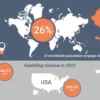Since 2005, there have been considerable changes in the gambling industry, with the UK rushing to stay ahead of current realities. Few policymakers in the early 2000s had any idea of the type and scope of the changes that would later impact society and the economy. Thanks to the internet, gamblers can now access gambling services practically anywhere.
The UK Finally Unleashes the White Paper with Stricter iGaming Regulations
Last update: May, 2024

To mitigate the risks of technological gambling, the UK government has released the “White Paper,” which seeks to introduce changes since the 2005 Gambling Act. This is after the government received over 16,000 submissions and held countless meetings to streamline gambling policies fit for the digital age.
Through Lucky Frazer, the Department for Culture, Media, and Sport told the Parliament on April 27: “This white paper outlines a comprehensive package of new measures to achieve these objectives across all facets of gambling regulation, building on our work over recent years.
Working with the Gambling Commission and others, we will now make online gambling safer with an overhaul of game design rules to remove the features known to exacerbate risks, and put new obligations on operators to prevent unchecked and unaffordable spending,” the statement adds.
The parliamentary address also outlines the ministry’s intention to combat aggressive marketing techniques like misleading bonuses and promotions. Additionally, the minister says the paper will seek to create independent messaging to increase awareness of gambling dangers while assisting in eradicating the stigma that prevents people from seeking help.
Another critical change that will come with the White Paper is creating an ombudsman. This office will hear gambling complaints and impose redress in collaboration with the government and the industry regulator when things head south. The paper also recommends more funding for the Gambling Commission to make its operations more assertive and aggressive.
Combating Widespread Problem Gambling
Frazer outlines that nearly 300,000 Brits suffer from “problem gambling.” The statement defines this as excessive gambling jeopardizing, disrupting, and harming families, communities, or individuals. An additional 1.8 million people are also thought to engage in high-risk gambling.
The ministry is worried that problem gambling can even result in suicide, with the White Paper seeking to increase player protection.
The “executive summary” reads: “Our aim in the Review has been to assess the best available evidence to ensure that our goals can be delivered in the digital age, and that we have the balance of regulation right between protecting people from the potentially life-ruining effects of gambling-related harm while respecting the freedom of adults to engage in a legitimate leisure activity.”
White Paper also outlines online slots as highly risky, leading to significant losses for players involved. Unlike land-based machines, online slots have no stake limits, with the paper recommending stake limits between £2 and £15 per spin. However, consultations are ongoing on slot-specific measures to protect 18-24-year-olds, who research shows are the most vulnerable.






















